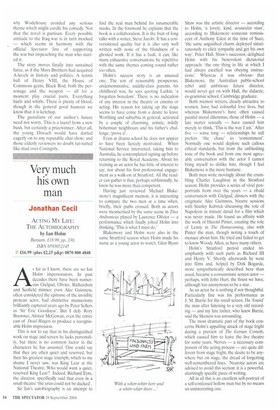Very much his own man
Jonathan Cecil
ACTING MY LIFE: THE AUTOBIOGRAPHY by Ian Holm Bantam, £18.99, pp. 330, ISBN 0593052145 © £16.99 (plus £2.25 p&p) 0870 800 4848 As far as I know, there are no Ian Holm impersonators. In past decades there have been numerous Gielgud, Olivier, Richardson and Scofield mimics: even Alec Guinness, often considered the epitome of the invisible protean actor, had distinctive mannerisms brilliantly captured years ago by Peter Sellers as 'Sir Eric Goodness'. But I defy Rory Bremner, Alistair McGowan, even the entire cast of Dead Ringers to produce a recognisable Holm impression.
This is not to say that in his distinguished work on stage and screen he lacks personality, but there is no common factor in the characters he has assumed. One could say that they are often quiet and reserved, but then his greatest stage triumph, which to my shame I never saw, was King Lear at the National Theatre. Who would want a quiet, reserved King Lear? Indeed, Richard Eyre, the director, specifically said that even in a small theatre 'the arias could not be ducked'.
Sir Ian's autobiography is an attempt to find the real man behind his innumerable masks. In the foreword he explains that the book is a collaboration. It is the fruit of long talks with a writer, Steve Jacobi. It has a conversational quality but it is also very well written with none of the blandness of a ghosted work. If it has a fault, it can, like many exhaustive conversations, be repetitive with the same themes coming round rather too often.
Holm's success story is an unusual one. The son of reasonably prosperous, undemonstrative, middle-class parents, his childhood was, he says quoting Larkin, 'a forgotten boredom'. There is no indication of any interest in the theatre or cinema or acting. His reason for taking up the stage seems to have come from a desire to leave Worthing and suburbia in general, activated by a couple of charming, artistic, mildly bohemian neighbours and his father's challenge, 'prove it'.
Even at drama school he does not appear to have been fiercely motivated. When National Service intervened, taking him to Australia, he contemplated signing up before returning to the Royal Academy. About his training as an actor he has little of interest to say, nor about his first professional engagement as a walk-on at Stratford. All the reader can gather is that, perhaps subliminally, he knew he was more than competent.
Having just reviewed Michael Blakemore's magnificent memoir, it is interesting to compare the two men at a time when, briefly, their paths crossed. Both as actors were mesmerised by the same scene in Titus Andmnicus played by Laurence Olivier — a performance which finally jolted Holm into thinking, 'This is what I must do.'
Blakemore and Holm were also in the same Stratford season when Holm made his name as a young actor to watch. Glen Byam Shaw was the artistic director — according to Holm, 'a lovely, kind, avuncular man', according to Blakemore someone reminiscent of Anthony Eden at the time of Suez, 'the same anguished charm deployed simultaneously to elicit sympathy and get his own way'. Peter Hall, Shaw's successor, delighted Holm with his benevolent dictatorial approach: 'the one thing in life at which I had always excelled was obeying instructions'. Whereas it was obvious that Blakemore, the Australian public-school rebel and ambitious future director, would never get on with Hall, the didactic, ex-grammar school, Cambridge graduate.
Both memoir writers, clearly attractive to women, have had colourful love lives, but whereas Biakemore's have often caused painful moral dilemmas, those of Holm — a late starter sexually — have caused him merely to think, This is the way I am.' After five — some long — relationships he still prefers 'the chase' to 'contentment'. Normally one would deplore such callous ethical standards, but from the unblushing tone of the book and from one most agreeable conversation with the actor I cannot bring myself to dislike him, though I feel Blakemore is the more humane.
Both men write movingly about the crumbling Charles Laughton in the Stratford season. Holm provides a series of vivid penportraits from over the years — a ribald conversation with Gielgud, dinners with the enigmatic Alec Guinness, bizarre sessions with Stanley Kubrick discussing the role of Napoleon in minute detail for a film which was never made. He found an affinity with the work of Harold Pinter, creating the role of Lenny in The Homecoming, also with Pinter the man, though noting a touch of menace about him. He tried and failed to get to know Woody Allen, as have many others.
Holm's Stratford period ended triumphantly with such parts as Richard III and Henry V. Shortly afterwards he went into films and, helped by Dirk Bogarde, more sympathetically described here than usual, became a consummate screen actor — perhaps, with John Hurt, the finest we have, although too anonymous to be a star.
As an actor he is nothing if not thoughtful. Particularly fine was his performance as J. M. Barrie for the small screen. He 'found' the man after listening to a very old recording — and my late father, who knew Barrie, said the likeness was astounding.
The most dramatic part of the book concerns Holm's appalling attack of stage fright during a preview of The Iceman Cometh, which caused him to leave the live theatre for some years. Nerves — a necessary com
ponent of the acting process are quite different from stage fright, the desire to be anywhere but on stage, the dread of forgetting well-remembered lines. Neurotic actors are advised to avoid this section: it is a powerful, alarmingly specific piece of writing.
All in all this is an excellent self-portrait of a self-confessed hollow man but by no means an uninteresting one.


















































































 Previous page
Previous page